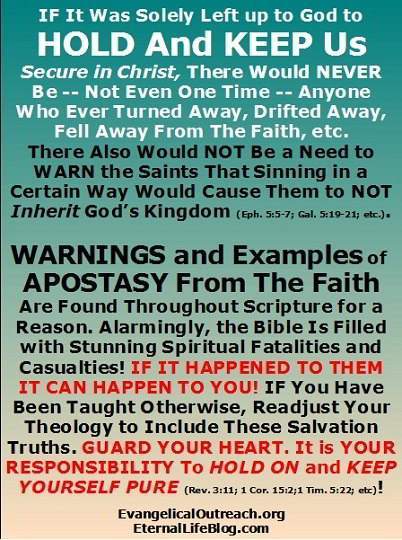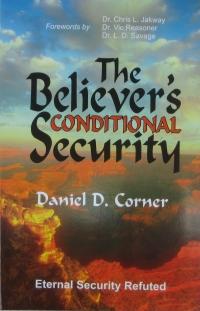“Wretched man that I’am” – A brief commentary on Romans 7
I have heard many times people using the words of Paul in Romans 7:24 saying: “Wretched man that I’m. Who will deliver me from this body of death?” They use them in a way that implies that these words are applying to us, the born again Christians. They use them like we Christians are in a kind of slavery to sin (it is in the same context, just a few verses earlier, that Paul says “I’m carnal, sold under sin” (Romans 7:14). They say then: “O wretched men we are”, “we are sinners, sold under sin”, “who will deliver us from this?”
In this article I submit that though people who love the Lord and want to follow Him – and only to such people this article refers to - can fall into many mistakes, they are NOT sold under sin, nor are they wretched men waiting for a deliverer. The deliverer has come and His name is Jesus Christ! He has opened the door of our prison and made us free. We are not “wretched men” any more. We WERE once wretched men when we were dead in the trespasses and sins (Ephesians 2:1). But now we are not dead anymore! God made us alive together in Christ, as a gift, only on the base of our faith (Ephesians 2:5)! Now we are “a chosen generation, a royal priesthood, a holy nation, a peculiar people; that we should show forth the praises of him who has called us out of darkness into his marvelous light” (1 Peter 2:9). This is the truth of God’s Word.
But then we are right to ask what is this pitiful situation that Paul is describing in Romans 7? To whom is he referring to? Why is he using this passage like it would apply for himself and why is he speaking in present tense like it is something that is happening now? Well, we do not need to go far to find the answer. All that we need is to read the context of the above phrases, the whole of Romans 7. Having a look at Romans 7 shows that its main topic is the law and how it was impossible for somebody that had only the sinful nature of Adam to fulfill this law. To say this, Paul is using first singular and present tense figuratively, not literally. In other words though it appears that he says what he says for himself personally, he only does this figuratively, putting himself into the position of those to whom these things were directly applicable. How do we know this? Let’s read for example the verses 7-9 of Romans 7:
Romans 7:7-9
“What shall we say then? Is the law sin? God forbid. No, I had not known sin, but by the law: for I had not known lust, except the law had said, you shall not covet. But sin, taking occasion by the commandment, wrought in me all manner of concupiscence. For without the law sin was dead. For I was alive without the law once: but when the commandment came, sin revived, and I died.”
The age “without the law”, was before the giving of the law, hundreds of years before the birth of Paul. So when Paul says “I was alive without the law once” he is using the first singular person (“I”) only figuratively. He was not alive at that time, but he figuratively puts himself into the position of the people who were alive saying “I was alive”. Same also for the next part of that passage that says: “but when the commandment came, sin revived and I died”. The commandment came with Moses and Paul was not alive then either.
It is obvious then that he is using himself (first singular) FIGURATIVELY, not literally. The same pattern continues throughout Romans 7. Paul uses himself and many times present tense to describe what was a PAST situation. The reason he does this is to make the situation more vivid and the contrast with the present situation (which is described in Romans 8) even more clearer. His main topic in Romans 7 is the without Christ situation. Before Christ the law was present, and though this law was good and holy and just it was impossible to be kept by people who had only their sinful, carnal1, nature. As he characteristically said:
Romans 7:12, 14
“Wherefore the law is holy, and the commandment holy, and just, and good ….. the law is spiritual: but I am carnal, sold under sin.”
Was Paul carnal when he was writing these things? Did he have only the old Adamic sinful nature? Was he “sold under sin”? The answer is empathically NO. Paul, as any born again believer, had Christ living in him. Christ had made him free. He was now born again and saved. To what therefore is he referring to when he describes himself as “sold under sin”? He refers to the age of the law, the main subject of Romans 7. In the age of the law, there was no new birth! There was no new nature! All these are things available to us after the sacrifice of Jesus but before that, in the age of the law, they were not available. Thus the only that people had at this time was the old sinful nature. Though the law was good and holy and just it was a spiritual law while they were carnal, sold under sin. When Paul therefore says “but I am carnal, sold under sin” he is using himself and present tense figuratively, putting himself into the place of those who lived in the age of the law, exactly as he did in verse 7 with those who lived without the law, when he said “I was alive without the law”. When Paul was writing Romans 7, he was a new creature as any of us, who has believed in the Lord Jesus Christ, the Messiah and Son of God, also is:
2 Corinthians 5:17 “Therefore if any man be in Christ, he is a new creature: old things are passed away;”
Paul uses the same way of speaking (first singular, present tense) throughout the remaining of Romans 7. Let’s read it:
Romans 7: 15-24 “For what I am doing, I do not understand. For what I will to do, that I do not practice; but what I hate, that I do. If, then, I do what I will not to do, I agree with the law that it is good. But now, it is no longer I who do it, but sin that dwells in me. For I know that in me (that is, in my flesh) nothing good dwells [this is a timeless truth: there is nothing good in the old man, in the flesh]; for to will is present with me, but how to perform what is good I do not find. For the good that I will to do, I do not do; but the evil I will not to do, that I practice. Now if I do what I will not to do, it is no longer I who do it, but sin that dwells in me. So I find it to be a law that when I want to do right, evil lies close at hand. For I delight in the law of God according to the inward man. But I see another law in my members, warring against the law of my mind, and bringing me into captivity to the law of sin which is in my members. O wretched man that I am! Who will deliver me from this body of death?”
What Paul is describing is a miserable situation. If you don’t take into account what is the context of the passage and if you ignore and discount the new birth realities you will get miserable too. You too you will cry “O wretched man that I am! Who will deliver me from this body of death?”. But Paul says all that he says to describe the situation before Christ. It is a situation longing for a deliverer. Yes, before Christ all of us would cry “O wretched men that we are. Who will deliver us from the body of this death”. But the good news is that some 2000 years ago the deliverer came!! His name is Jesus Christ! Paul does not stop to the question: “O wretched man that I am! Who will deliver me from this body of death?” but he immediately continues with the answer and here it is:
Romans 8:1-4 “There is therefore now no condemnation to those who are in Christ Jesus. For the law of the Spirit of life in Christ Jesus HAS MADE ME FREE FROM THE LAW OF SIN AND DEATH. For what the law could not do in that it was weak through the flesh, God did by sending His own Son in the likeness of sinful flesh, on account of sin: He condemned sin in the flesh, that the righteous requirement of the law might be fulfilled in us who do not walk according to the flesh but according to the Spirit.”
There was a time when we were slaves, sold under sin. But no more! By believing in the Lord Jesus Christ, He freed us from this slavery. Now we have a new nature, Christ in us. Now we are FREE. Now
we are righteous!
To summarize: here is the question of Paul in Romans 7:24:
“O wretched man that I am! Who will deliver me from this body of death?””
And here is the answer just 2 verses later:
“the law of the Spirit of life in Christ Jesus HAS MADE ME FREE FROM THE LAW OF SIN AND DEATH.”
And again Galatians 5:1
“Stand fast therefore in the freedom wherewith Christ has made us free, and be not entangled again with the yoke of bondage.”
We are no longer slaves, sold under sin. We are no longer “wretched men”. Instead Christ our deliverer, came, gave himself as ransom and made us FREE. Next time therefore you will hear somebody crying “O wretched men that we are!”, implying that this is what we are now, you know that such an application to us is WRONG. Praise the Lord and thanks be to God always, who, through His Son, has delivered us from this dreadful situation. Praise be to him always that though we were once “dead in the trespasses and sins …. God, being rich in mercy, because of the great love with which he loved us, even when we were dead in our trespasses, made us alive together with Christ” (Ephesians 2:1-5). Praise be to Him and to Jesus our deliverer always.
Please check out Anastasios's book "The Warnings of the New Testament". Purchase at Kindle and Amazon or download for FREE at: http://www.jba.gr/Articles/pdf/the-warnings-of-the-New-Testament.pdf

It is important to know about because you will probably never hear any eternal security teacher say outrightly their doctrine is a license for immorality. In fact, they will most often flatly deny this charge sometimes to the point of yelling slander. However, there are still various ways these people teach this very thing they hate to be identified with. Again, this is through their twisted version of the sin unto death. The apostle John wrote of this sin:
click the book



 drift away (Heb. 2:1)
drift away (Heb. 2:1)
